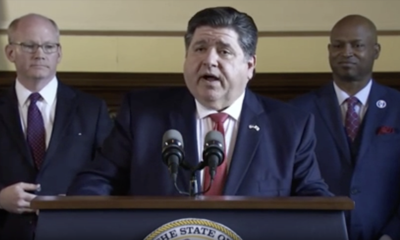
Illinois Gov. JB Pritzker, flanked by Illinois Senate President Don Harmon, left, and House Speaker Emanuel "Chris" Welch, right
SPRINGFIELD, ILLINOIS - A group of Illinois Republican state lawmakers have taken to the courts to challenge the passage of Illinois' $55 billion budget legislation, saying the Illinois Supreme Court needs to rein in Democratic leaders' increasing reliance on a controversial and constitutionally questionable legislative practice.
"The people of Illinois deserve an honest process," said State Sen. Andrew Chesney, R-Freeport, in a statement announcing the legal action. "Instead, they got a budget rammed through in the middle of the night with no time to read it and no debate.
"That's not transparency. That's not democracy. And it sure as hell isn't constitutional."
Chesney joined with other members of the so-called Illinois Freedom Caucus, a group of conservative Republican members of the Illinois state Senate and state House of Representatives, to file the lawsuit on June 5 in Sangamon County Circuit Court in Springfield.
Others who signed on as plaintiffs in the action include Illinois State Reps. Adam Niemerg, of Dieterich; Chris Miller, of Hindsboro; Brad Halbrook, of Shelbyville; Blaine Wilhour, of Beecher City; Jed Davis, of Newark; and David Friess, of Red Bud.
Chesney was the only member of the state Senate to sign onto the complaint.
The lawsuit names as defendants the Democratic leaders of the General Assembly, Illinois House Speaker Emanuel "Chris" Welch and state Senate President Don Harmon.
In the lawsuit, the Republican lawmakers accuse Welch and Harmon of violating the Illinois state constitution in the way they and their Democratic colleagues rammed through legislation approving Democrats' Illinois state budget and appropriations package.
As with a number of other pieces of legislation during the spring session, leaders of the Illinois Democratic legislative supermajority dropped the budget bill, numbering thousands of pages and covering more than $55 billion of state spending, on lawmakers' desks in the final hours of the Illinois General Assembly's spring legislative session, just before a June 1 deadline mandated by law.
They accomplished the task using a controversial legislative tactic known as "gut and replace."
Under the Illinois state constitution, no legislation can be passed into law without receiving three separate readings on three separate days in each house of the General Assembly.
However, Democrats in Springfield have become adept at sidestepping those requirements using the "gut and replace" tactic.
Under that tactic, lawmakers first locate so-called "shell bills," or seemingly innocuous legislation that has already moved through most of the constitutionally required "three readings" process.
The so-called "shell bills" have typically already received all but one of those required readings, before being set aside for future use.
Then, typically in the closing moments of a legislative session, members of the supermajority amend those "shell bills" with legislation that completely replaces everything but the title of the bill and allows often controversial legislation to be passed on just one reading and quick votes in both the state House and Senate, before advancing to the governor for a likely quick signature.
In recent years, Illinois Democrats have used that process to quickly enact a variety of controversial and constitutionally questionable laws, including state laws substantially reforming the state's criminal justice system, eliminating cash bail, outlawing so-called "assault weapons," and forbidding Illinoisans from challenging the constitutionality of new state laws, except in courts in Chicago and Springfield, among others.
Critics say the tactic is used by the supermajority Democrats in an an increasingly brazen fashion to stymy any debate and allow no effective opposition to form that might threaten Democrats' legislative priorities.
However, to this point, legal challenges to such legislation for violating the "Three Readings" clause has failed repeatedly, as the Illinois Supreme Court has repeatedly refused to get involved.
Specifically, the Illinois Supreme Court has declined to review or overturn a previous holding, which established the so-called "Enrolled Bill Doctrine." Under that doctrine, the Illinois Supreme Court essentially declared that Illinois' House Speaker and Senate President can simply sign a certification that their respective houses abided by the Three Readings Rule and any other constitutional rules when enacting legislation.
The “Enrolled Bill Doctrine” then requires Illinois state courts to accept that certification and reject challenges to laws based on the Three Readings Rule, no matter any amount of evidence to the contrary.
Republicans on the state Supreme Court and justices on Illinois appeals courts have in recent years repeatedly called on the Democrats who dominate the state Supreme Court to require Democratic lawmakers to follow the state constitution when passing laws.
“To turn a blind eye to repeated violations of the constitution suggests ‘that the courts must perpetually remain in ignorance of what everybody else in the state knows,'" wrote Justice Lisa Holder White in a dissent in a case involving Illinois' "assault weapons" ban.
Most recently, Illinois Fifth District Appellate Justice David Boie wrote in an opinion published in May that Democratic state Supreme Court justices refusal to address the increasing abuse of the Enrolled Bill Doctrine leaves lower courts in an untenable position of abiding by "flagrant misrepresentation of the facts" by Illinois lawmakers when they claim laws were constitutionally approved.
As with other legal challenges under the Three Readings Rule, the Enrolled Bill Doctrine will leave any Sangamon County judge unable to rule in favor of the Republicans, and the case will be dismissed.
However, that would set the stage for an appeal to the Illinois Supreme Court - the only court anywhere with the power to address the perceived constitutional violations.
In the lawsuit, the Republican lawmakers note the state budget dropped on their desks on May 30 with just about 30 hours to go before the vote deadline of midnight on May 31. They noted the legislation included 3,363 pages and 1.7 million words.
They asserted humans would require at least 70 hours to read the bill all the way through one time, using a standard reading rate of 238 word per minute.
The compressed timeframe, then, deprived the lawmakers of their constitutional roles to represent their constituents, the lawsuit said.
"The Plaintiffs in this case, due to the actions of the Defendants and the General Assembly, did not have enough time to read the bill much less engage in any ability to confer with their constituents, obtain their constituent’s (sic) thoughts on the bill, do adequate research on the bill, nor did they have the time to fully advocate for their constituents on this SB 2510 which has $55.2 Billion in spending," the lawsuit said.
"There is no other motive for holding the budget portion of SB 2510 until the day before the vote other than to completely eliminate debate on the propriety and usefulness of the budget presented by the majority party to the minority party of the General Assembly."
The Republican lawmakers further assert the Three Readings Rule applies not only to the shell bills, but to every substantive amendment to legislation.
The plaintiffs conceded the Enrolled Bill Doctrine would likely force the judge to toss their lawsuit to tee up an appeal.
"However, Plaintiffs do not concede this ends the inquiry and affirmatively assert that the Enrolled Bill Doctrine must fail as it cannot be reconciled with Article IV, Section 8(d) and our Illinois Supreme Court made it clear continued abuses of this constitutional requirement would result in the Courts’ stepping in," the Republicans wrote in their complaint.
"Any further deference under the Enrolled Bill Doctrine by the Courts allows the General Assembly to blatantly and systematically continue its subversion of this unambiguous constitutional mandate by certifying, with no discernable standards, penalty, or review, that it has complied with Article IV, Section 8 when unequivocal violations are in plain sight.
Welch and Harmon, they said, "... have engaged in continuous and repeated conduct in violation of the Illinois Constitution ... on numerous occasions and are doing so for the intent and purpose of limiting the input of the citizens of the State of Illinois and preventing them from participating in the legislative process through their duly elected representatives to the House and Senate.
"... For the judiciary branch to refuse to weigh in the continued and repeated violations of the three readings rule in Illinois would be to turn over their constitutional duty under the Illinois Constitution to ensure that the legislature is abiding by the provisions of the Constitution of Illinois when passing legislation to two men, the Speaker of the House and the President of the Senate, who have shown that their oath to uphold the Constitution and all its provisions means little more than the time it takes them to sign their names," the Republicans wrote in their lawsuit.
The Republican lawmakers are seeking court orders blocking the implementation of the new state budget and blocking Welch and Harmon from using the Enrolled Bill Doctrine to certify the passage of legislation moving forward.
The Republican lawmakers are represented by attorney Bryan A. Drew, of the Drew Law Group, of Benton.
In a statement emailed to The Record, Drew said: “I appreciate Senator Chesney and the representatives trusting me with this important litigation. When nearly a billion dollars in new taxes and $55.2 billion in spending are on the table the people of Illinois deserve more than middle-of-the night votes and rushed bills. This isn’t just unconstitutional, it’s a betrayal of the trust the citizens put in their elected officials.”


